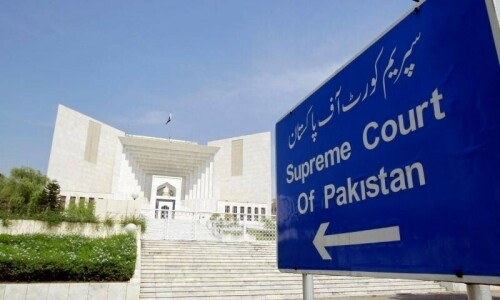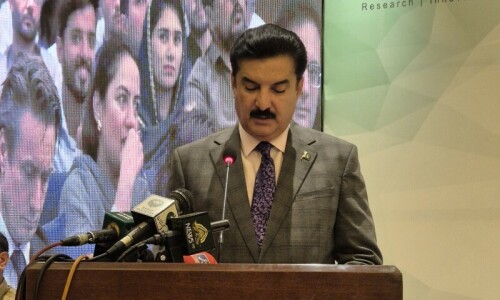ISLAMABAD: Highlighting about Rs60 billion worth of cost of inefficiency being charged to consumers in three months, the National Electric Power Regulatory Authority (Nepra) on Wednesday notified Rs1.28 per unit negative fuel cost adjustment (FCA) against consumption in September and asked the ex-Wapda distribution companies (Discos) to refund it in consumer bills for November.
This will have a gross financial impact of about Rs9.8bn.
However, since a negative FCA of 86 paise per unit was applicable in October bills on account of August consumption, the fuel cost would go down only 42 paise per unit, according to a Nepra statement.
Interestingly, even a 42 paise reduction in FCA would not benefit the domestic consumers using less than 300 units, agricultural consumers, etc., under the government policy for being subsidised consumers.
The net financial impact on Discos’ accounts, therefore, works out to be less than Rs4.6bn.
Strangely, Member Tariff Mathar Niaz Rana, who has been expressing concerns over payments to bagasse-based plants linked to imported coal prices, did not sign the FCA determination.
Member Technical Rafique A. Shaikh wrote an additional note pointing over Rs60bn additional cost of inefficiencies or mismanagement to consumers in three months.
This coincided with fresh petitions from the Discos seeking about Rs8.7bn burden to be passed on to the consumers on account of quarterly tariff adjustments (QTA) for July-September 2024-25.
In a notification issued on Wednesday, the regulator said that “adjustment of Rs1.2754/kWh shall apply to all the consumer categories except lifeline consumers, domestic consumers consuming up to 300 units, Electric Vehicle Charging Stations, pre-paid electricity consumers of all categories who opted for pre-paid tariff and agriculture consumers of all the ex-Discos”.
It asked Discos to show separately the negative FCA in the consumers’ bills based on units billed in September and reflect it in November’s bill.
Nepra notifies a meagre Rs1.28 per unit refund for September
In his additional note, Mr Rafique Sheikh noted a series of inefficiencies in generation and transmission networks with significant implications for monthly FCAs and asked the relevant government forums to address them.
He said the open cycle operation of 747MW Guddu plant in September incurred a loss of Rs520 million as its generation cost was 1.5 times higher than the combined cycle mode.
“The cumulative loss for FY25 from this operation is around Rs2.3bn,” he said, adding that reduced generation of this plant in September led to increased reliance on costlier plants, resulting in a loss of about Rs6.4bn. “The total accumulated loss for FY2024-25 due to higher-cost generation is more than Rs18 billion,” he said.
He also pointed out that the absence of 969MW Neelum-Jhelum plant in September increased reliance on costlier plants, causing a loss of around Rs4.9bn, based on historical generation and marginal costs. “The total accumulated loss for FY25 due to higher-cost generation is Rs17.2bn,” he said.
In addition, the non-production of energy from the 747MW Guddu and 969MW Neelum-Jhelum power plants also places a significant foreign exchange burden on the national exchequer.
Moreover, against a dependable capacity of 22,541MW from thermal ‘take or pay’ power plants, the average utilisation for September was only around 40pc, he said. The generation of 12,487GWh in September, against a dependable capacity of 37,069MW, reflected an average utilisation factor of 47pc of the dependable capacity.
The sale of electricity in September decreased by 1,372GWh compared to the reference value.
The total reduction in electricity sales for the first quarter of 2024-25, compared to the reference value for the same period, amounted to 5,189GWh.
This decline may lead to an increase in the quarterly adjustment for electricity consumers, the Nepra member pointed out.
On top of that, he said the average utilisation factor of the HVDC line from Matiari to Lahore during September 2024 was only 46pc, while consumers were still paying for a 100pc capacity factor.
The September partial load adjustment charges (PLAC) amounted to Rs3.864bn.
“Cumulatively, the PLAC for FY2024-25 has now reached more than Rs14bn,” he said.
As if that was not enough, it was highlighted that the amount for previous adjustments stood at Rs9.7bn during September.
This significant backlog of previous adjustments is undesirable.
Also, in September 2024 alone, system constraints resulted in a financial impact of approximately Rs529 million, contributing to a total of Rs7.778bn for the first quarter of FY25.
Published in Dawn, November 7th, 2024














































